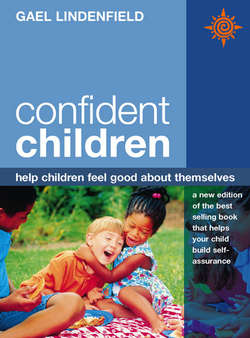Читать книгу Confident Children: Help children feel good about themselves - Gael Lindenfield, Gael Lindenfield - Страница 22
The 8 ‘nutrients’ children need
Оглавление1 Love – and it’s not just quantity but excellent quality that is important. Children need to be loved consistently and unconditionally. For the development of sound, lasting self-esteem, they must feel that they are valued for who they actually are, rather than what they could be or what others would like them to be.
2 Security – fear and anxiety are perhaps the greatest enemies of confidence. Children who are constantly worried that their basic needs won’t be met, or that their emotional or physical world may be blown apart at any minute, will find it very difficult to develop a positive outlook about themselves, other people and the world in general. When children feel secure, they will automatically try to develop their potential (and therefore their confidence) through responding to challenges and taking interesting risks.
3 Role-models – teaching through example is by far the most effective way to help children develop the attitudes and social skills required for confidence. People often ask me if they are likely to pass on their fears and anxieties to their children. Of course the depressing answer is – yes, unless a strong countering influence from other significant figures is consistently experienced.
4 Relationships – to develop the confidence to relate to ‘all sorts’, children obviously need to experience and experiment in a wide range of relationships, from the close intimate ones usually found at home through to the more superficial ones with bus drivers and shop assistants, through to doctors and even vote-catching politicians! Through relationships, children also build up self-awareness and self-knowledge, which are vital ingredients of inner confidence.
5 Health – in order to make the best use of our strengths and talents we need energy! We know for example, that children who are undernourished cannot learn as effectively and are therefore unable to use their full potential. We also know that children ‘bloom’ when they are in good health – and in our society there is no doubt that good-looking children are likely to receive more morale-boosting compliments, attention and even opportunities.
6 Resources – perhaps the children of our ancestors in caves did not need money or material or educational resources in order to help them develop confidence, but we now live in an increasingly complex world. Wrong though it may be, children who have plenty of access to resources such as books, toys, musical instruments, sports facilities, extra tuition and travel certainly have an advantage over those whose options are more restricted. Such resources are not, of course, essential to the development of a core of either inner or outer confidence, but (used well and appropriately) they can certainly give both a powerful boost by providing the kind of opportunities that encourage the development of children’s potential by enabling them to use their strengths or improve their weaknesses.
7 Support – of course it is not enough to have resources alone, children need encouragement and guidance on how to use them to their best advantage. They need people who are ‘rooting’ for them to become more confident and skilful, people who will give them honest, constructive feedback both when they are doing well and when they are failing (perhaps through setting themselves unrealistic goals). Support also is an essential factor in helping children heal from the knocks to confidence that trauma, hurt and disappointment undoubtedly can bring. For example, a rejection by a friend or a failed exam has the capacity to dent self-confidence – but for how long and how deep will depend very much on the kind of support that surrounds a child. I am convinced that it is the ‘handling’ of traumas and losses rather than the events themselves which plays a decisive role.
8 Rewards – although the process of developing confidence (like any other kind of learning) can in itself be exciting and rewarding, sometimes it most certainly is not. ‘Pay-offs’ for efforts and achievements while on the road to our more distant goals are often not just desirable but essential, even for the most ambitious among us. Children are certainly no exception to this pragmatic rule. The ones who are fortunate enough to receive regular and ample ‘fruits’ (and, of course, I don’t mean necessarily material benefits) for their efforts, are far more likely to retain their natural appetites for morale-boosting challenge than those who do not.
Seeing these factors listed in such a concise manner makes the nurturing task look so straightforward and easy! Perhaps it is for a small minority of Super Confident parents who themselves learned the ‘trade secrets’ from their perfect parents. But I know that my own experience of trying to provide my children with an adequate supply of the above has been the most challenging and difficult undertaking of my life. Even though my heart was certainly in the right place and, because of my professional training, my head was packed full of the right information, my actual ability to provide my children with a consistent supply of these nurturing factors remained woefully deficient for many years.
The good news is that, however difficult it is to become the kind of parents who are capable of producing confident, self-assured children, nowadays it is rarely impossible for any of us. Present day, post-Freud parents do now have a distinct advantage over those of earlier centuries. We have the tried and tested wisdom of several generations of psychologists, psychotherapists and educationalists to guide us through our parenting. But before we begin to apply this enlightened knowledge directly to our children, we must first make use of it ourselves!
‘To respond to our children’s needs we must change ourselves. Only when we are willing to undergo the suffering of such changing can we become the kind of parents our children need us to be.’
M. Scott Peck
